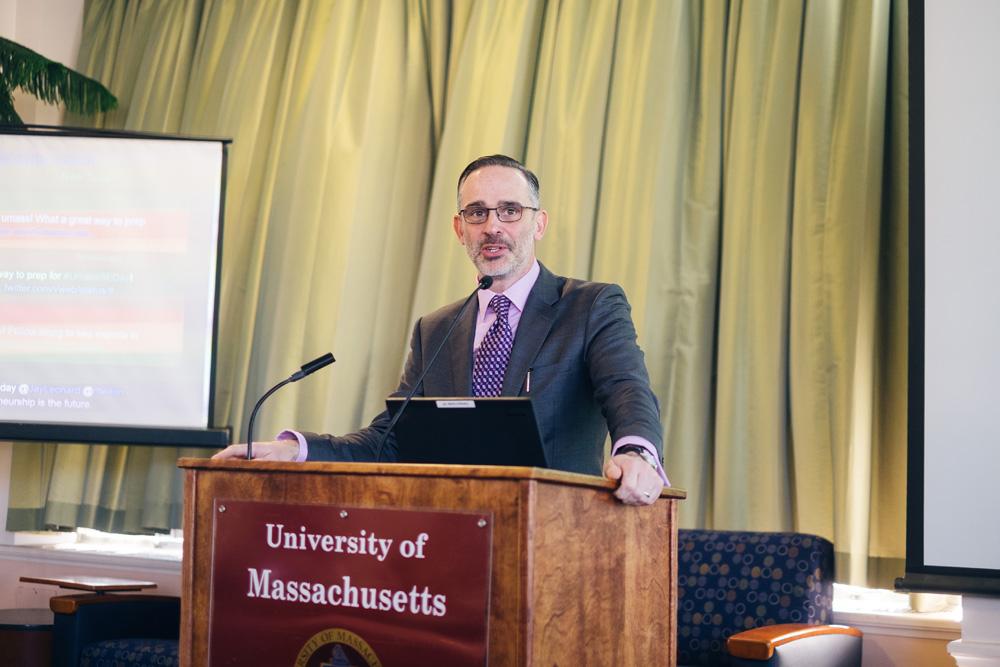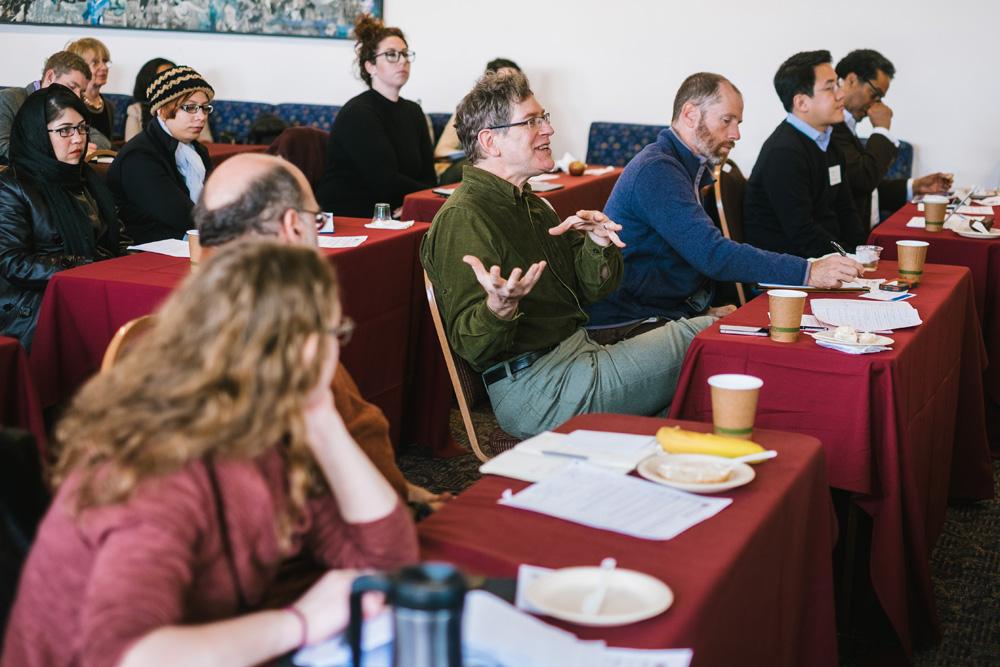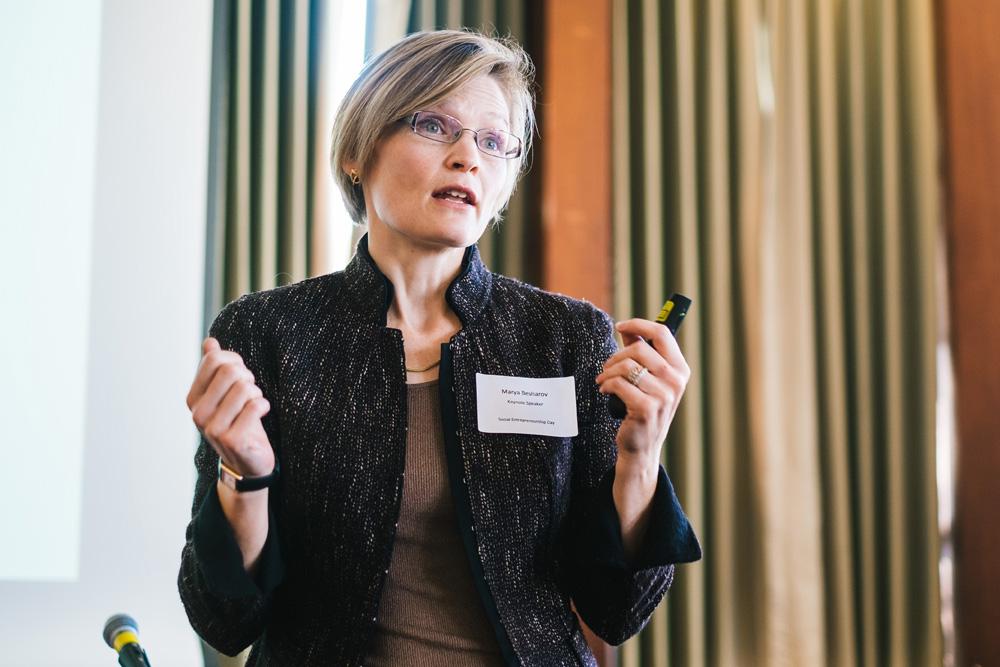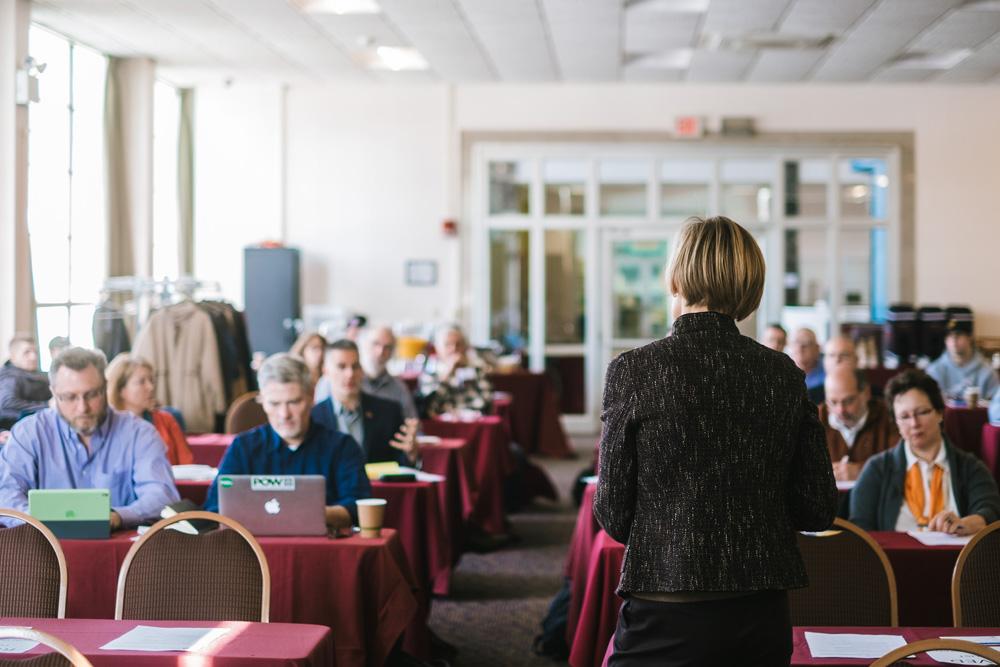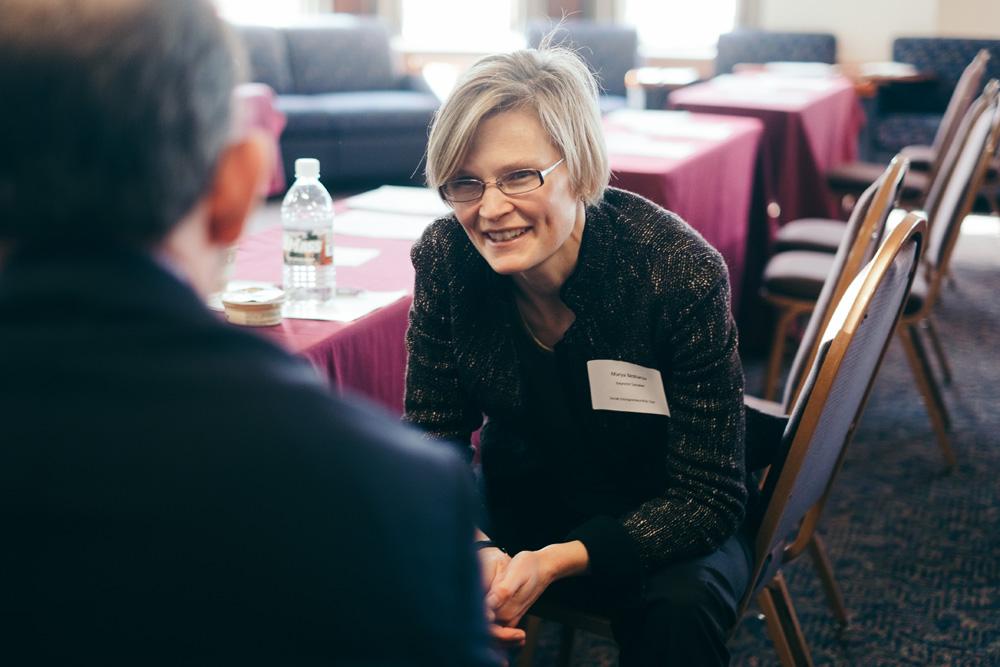Social Entrepreneurship Day Explores Progressive Businesses and Their Hybrid Missions
December 12, 2016
The pursuit of business and social goals in “hybrid” social enterprises was a key theme in the second annual Social Entrepreneurship Day, on December 6th in the Student Union’s Cape Cod Lounge. Coordinated by the Isenberg-based Berthiaume Center for Entrepreneurship, the day-long event featured a keynote presentation by Cornell University/ILR School professor Marya Besharov and separate practitioner and academic panels.
After welcoming the event’s sixty attendees, Tom Moliterno, Isenberg’s Vice Dean & Associate Dean of Research and Engagement, who is also Earl W. Stafford Professor in Entrepreneurial Studies, introduced Mr. Stafford, a long-time proponent and sponsor of social entrepreneurship at Isenberg. “Making this a better world shouldn’t be separate from everything else,” Earl told the gathering, advocating “close and collaborative relationships among stakeholders in this community—including [business] practitioners.”
The Hybrid Organization Lens
Social enterprises combine social and business missions. That makes them quintessential hybrid organizations—a “useful lens both for researchers and practitioners,” observed Marya Besharov in her keynote remarks. Besharov drew on two case studies to illustrate challenges in managing competing interests in two hybrid organizations—a nationally prominent natural foods supermarket chain and a social enterprise in Cambodia and Laos that employs low-income youth as providers of digital content services.
The natural foods chain, she noted, attracted two camps of employees—one with a socially idealistic agenda and the other from a more business-as-usual background. “How do you hold both [groups] together?” asked Besharov. Managers, she concluded, must “function as pluralists,” developing integrative solutions and valuing each camp’s perspectives. That pluralist perspective was equally critical as a strategic management tool in balancing business and idealistic agendas in the Cambodia/Laos social enterprise. Its leaders, in fact, “insisted that the conflicts should go together,” noted Besharov. That ultimately furthered “structured flexibility” along with social and market success. Later in the day, a panel of three academics* further explored hybrid organizing and organizations.
Practitioner Perspectives
Immediately following the keynote, Dean Moliterno introduced a panel of practitioners who described their work in combining business and social goals. First up was Michael Alden ’04, who runs Language Bank, a Worcester- and Manchester, New Hampshire-based translation service. “We are self-sustaining. We provide education, employment, and assistance,” he told the gathering. Language Bank, he continued, employs over 200 interpreters, many of them refugees resettled by its parent organization, Ascentria Care Alliance (formerly Lutheran Social Services of New England). Language Bank interpreters are fluent in some sixty languages, including many regional variants.
“We operate fee-for-service. Our customers choose us because we provide them with what they want,” remarked Alden, an Isenberg accounting graduate who also earned an M.S. degree from the University of Virginia and an MBA from the University of North Carolina. Those clients, he continued, include hospitals, legal firms and courts, government agencies, for-profit companies, and not-for-profit organizations. Services include on-site and over-the-phone interpretation, document translation, and language training.
Refugees, he added, comprise one-third of Language Bank’s staff. “Our wage is significantly higher than what most refugees earn. It is a living wage. It’s about empowering people and strengthening communities through market-based strategies,” he said. And it succeeds by meeting a need and creating scalable solutions that meet future demand and propel growth.
“We support start-ups in Springfield and the Pioneer Valley,” a second panelist, Jay Leonard ’06 MBA told the gathering. That entails building an entrepreneurial “ecosystem” that leverages the region’s strategic resources, including its wealth of colleges and universities. “We want students to stick around the Valley after graduation to pursue entrepreneurial and other professional opportunities,” he remarked.
A director with the MassMutual affiliate, Barings, Jay co-leads MassMutual’s $5 million entrepreneurially focused Springfield Venture Fund. He is also a board member, mentor, and facilitator with Valley Venture Mentors (VVM), a Springfield-based non-profit that supports entrepreneurs through diverse resources, including separate accelerators for startups, manufacturing, and—beginning in June— student entrepreneurs.
Modeled after MassChallenge in Boston, the startup accelerator offers training, connections, and capital opportunities. Startups accepted into the accelerator compete for up to $50,000 in grants at the four-month program’s conclusion.
“Last year, we graduated 36 teams from the startup accelerator,” Jay continued. (The first cohort of from the manufacturing accelerator is due to graduate in January.) In May, the accelerator awarded $252k in seed money to 12 of those startup graduates. The largest award ($50k) went to Celia Grace, a fair trade, eco-friendly purveyor of wedding dresses. (Its founder and CEO, Marcie Muehlke, is a 2012 Isenberg MBA grad.) In June, VVM will inaugurate its accelerator for student entrepreneurs. “The goal is to get the best student teams from all 14 schools in the Valley,” noted Leonard.
True to the Valley’s comparative advantage in higher education, the accelerator initiative, with Jay as its point person, enlisted Isenberg MBA students last spring to evaluate VVM Accelerator startups that aspired to raise capital. Twenty startups, he noted, signed up. After the students performed due diligence, the Springfield Venture fund invested in five of those companies. “All were pre-seed or seed-stage start-ups,” he emphasized.
Panelist Laurie Lane-Zucker’s vision for entrepreneurship in the Berkshires is no less ambitious. His Impact Entrepreneur Center (IEC) in Sheffield fosters socially progressive, triple bottom line ventures. (i.e., enterprises with measurable bottom lines for profitability, social, and environmental performance.) “We need to build these businesses (B corporations), in a systems-focused ecosystem that allows us to grow and sustain entrepreneurs,” Lane- Zucker told the gathering.
The IEC gives local, actionable play to the principles and practices advocated by two other Lane-Zucker undertakings: his LinkedIn-based Impact Entrepreneur Network of 13,500 members in 150 countries and his consulting initiative, Impact Entrepreneur. All three pursue sustainable development goals, illustrated by Lane-Zucker in a chart that depicted 17 of them—elimination of poverty and hunger; affordable, clean energy; industry, innovation, and infrastructure; sustainable communities; and many others.
As a place-based regional impact economy, the Berkshires, noted Lane-Zucker, is poised for entrepreneurial creativity. That includes, he said, its thousand or so nonprofit organizations and higher education infrastructure—many of which should dovetail with the incubation of socially conscious businesses. It’s a replicable process, Lane-Zucker remarked. “Let’s add that for-profit hybrid to the Berkshires!” he urged. To that end, he is developing an accelerator which, with other resources, will prove “deeply educational.” And he has secured partnerships with Williams College, Berkshire Community College and the Massachusetts College of Liberal Arts.
________________________________________________
*Elizabeth Schmidt, School of Public Policy UMass Amherst; Suntae Kim, Carroll School of Management, Boston College; Wiljeana Glover, Babson College

